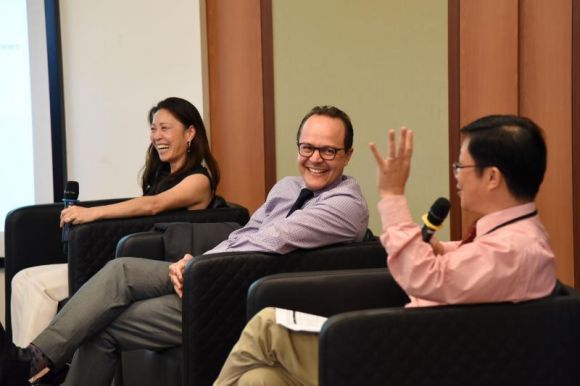For Cen Xu (above, far left), the scientific discovery process is all about problem-solving and finding answers to the unknown. As Amgen’s scientific director for neuroscience, Xu has experienced the thrills and anxieties of that process firsthand—most notably in work with her team over 2 decades to develop a new migraine medication.
She recently shared some of those experiences at the Amgen Scholars symposium in Singapore, which included not only undergraduate biotech researchers but also teachers and others from the Amgen and local communities. Speaking to this diverse group, Xu said to never be afraid to try, even if it might not be the right direction at first.
Xu says that she was impressed by the many questions scholars had at the symposium and recalls a memorable moment: “One of the girls stood up and told me she was from my hometown in China! She shared the same challenge I faced when I moved to the United States,” Xu says. “We bonded more after the session, and she is now very confident that the hardship she is going through will make her stronger.”
After the symposium, ABE spoke with Xu about her experiences to learn more about her scientific journey.
What first inspired you to pursue science?
My father was an engineer and my mother was a teacher. Both taught me how to problem-solve from very early on, which has benefited me until today. Probably because of that, I felt I have always been on a mission to try to find problems to solve.
What was your high school science experience like?
I had minimum hands-on opportunities in high school, but those very few, including isolating the sciatic nerve from a frog and watching how it controls the muscle contractility, definitely left a huge impression. It was also very important that we focused on basic concepts and building a foundation. Although sometimes that felt boring, it benefited me tremendously with a solid starting point.
Is there anything you wish you knew in high school that would have better prepared you for your career?
I wish I knew my interest towards science subjects in high school were heavily influenced by teachers. I loved chemistry through my junior year and was prepared to major in chemistry. However, during my senior year, it quickly turned 180 degrees when we got a new teacher who did not believe women could be successful in science. I spent a lot of time being upset and fighting him instead of continuing with my passion to chemistry.
You mentioned facing challenges when you moved to the United States from China. Can you share a little bit of that story?
In addition to being in a brand new country for the first time in my life, the new language, especially scientific terminology, was very foreign; my education up until then was all in Chinese, and English was my second language. My first class in the U.S. was in cell biology. I went into a classroom with a very long blackboard from left to right and with 3 rows of a total of 12 seats. I sat down in the first row and was one of six students in that class. My professor was a tall man with a full mustache; his speech was a bit muffled and I could not see his lips. He was also a fast writer, filling up the blackboard multiple times in cursive throughout the class. At the end of that 60-minute class, I recognized almost no words on the chalkboard, and only understood “good morning” and “thank you!.” It was devastating at that moment to say the very least.
Despite those struggles, you went from university and getting a PhD into the biotech industry, eventually ending up at Amgen. Can you share a bit about the discovery process for the migraine medicine?
I worked in the migraine field for more than 20 years and witnessed many patients suffer from the debilitating disease. Amgen’s leading biotechnology expertise was one of the key factors that enabled the design and development of this particular medicine.
The discovery process was not conventional. We used an antibody, which does not travel past the blood-brain-barrier, to treat a perceived “brain” disease. At the beginning, when I socialized the idea, one of the key opinion leaders in the migraine field told me that “it will never work.” In addition to that, technically, it was very challenging to make an antibody against a protein with two components that were not unique to this combination. We diligently analyzed the available information, did thorough calculation, and concluded that an antibody does not have to get into the brain to have an effect.
What is most challenging about the discovery process?
Unknowns. It is that desperation/anxiety of not knowing whether going down a particular path is going to get you to where you want to go. It is a constant test of your decision-making skills without all the information.
What advice do you have for students interested in pursuing biotechnology?
Build a strong science foundation/curriculum in high school and college, and explore as many directions as you can to find your passion.
Is there anything else you would like to add?
I believe science has no boundaries, and scientists should get together to exchange their thoughts and ideas whenever possible. These interactions may not have to be face to face, so travel limitations should not stop the scientific exchange. I attend two or three scientific meetings each year to “recharge” myself; it is critical we connect and share in our community.
